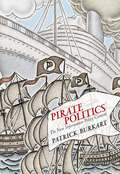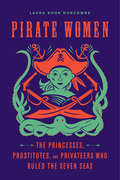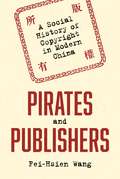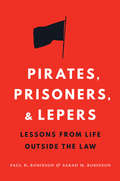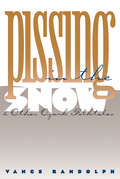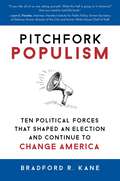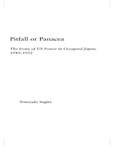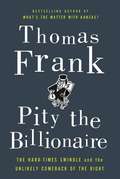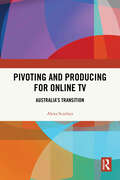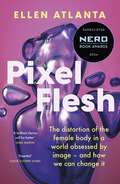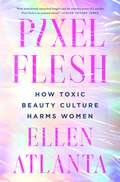- Table View
- List View
Pirate Politics
by Patrick BurkartThe Swedish Pirate Party emerged as a political force in 2006 when a group of software programmers and file-sharing geeks protested the police takedown of The Pirate Bay, a Swedish file-sharing search engine. The Swedish Pirate Party, and later the German Pirate Party, came to be identified with a "free culture" message that came into conflict with the European Union's legal system. In this book, Patrick Burkart examines the emergence of Pirate politics as an umbrella cyberlibertarian movement that views file sharing as a form of free expression and advocates for the preservation of the Internet as a commons. He links the Pirate movement to the Green movement, arguing that they share a moral consciousness and an explicit ecological agenda based on the notion of a commons, or public domain. The Pirate parties, like the Green Party, must weigh ideological purity against pragmatism as they move into practical national and regional politics. Burkart uses second-generation critical theory and new social movement theory as theoretical perspectives for his analysis of the democratic potential of Pirate politics. After setting the Pirate parties in conceptual and political contexts, Burkart examines European antipiracy initiatives, the influence of the Office of the U.S. Trade Representative, and the pressure exerted on European governance by American software and digital exporters. He argues that pirate politics can be seen as "cultural environmentalism," a defense of Internet culture against both corporate and state colonization.
Pirate Politics: The New Information Policy Contests (The Information Society Series)
by Patrick BurkartAn examination of the Pirate political movement in Europe analyzes its advocacy for free expression and the preservation of the Internet as a commons.The Swedish Pirate Party emerged as a political force in 2006 when a group of software programmers and file-sharing geeks protested the police takedown of The Pirate Bay, a Swedish file-sharing search engine. The Swedish Pirate Party, and later the German Pirate Party, came to be identified with a “free culture” message that came into conflict with the European Union's legal system. In this book, Patrick Burkart examines the emergence of Pirate politics as an umbrella cyberlibertarian movement that views file sharing as a form of free expression and advocates for the preservation of the Internet as a commons. He links the Pirate movement to the Green movement, arguing that they share a moral consciousness and an explicit ecological agenda based on the notion of a commons, or public domain. The Pirate parties, like the Green Party, must weigh ideological purity against pragmatism as they move into practical national and regional politics.Burkart uses second-generation critical theory and new social movement theory as theoretical perspectives for his analysis of the democratic potential of Pirate politics. After setting the Pirate parties in conceptual and political contexts, Burkart examines European antipiracy initiatives, the influence of the Office of the U.S. Trade Representative, and the pressure exerted on European governance by American software and digital exporters. He argues that pirate politics can be seen as “cultural environmentalism,” a defense of Internet culture against both corporate and state colonization.
Pirate Women: The Princesses, Prostitutes, and Privateers Who Ruled the Seven Seas
by Laura Sook DuncombeIn the first-ever Seven Seas history of the world's female buccaneers, Pirate Women: The Princesses, Prostitutes, and Privateers Who Ruled the Seven Seas tells the story of women, both real and legendary, who through the ages sailed alongside—and sometimes in command of—their male counterparts. These women came from all walks of life but had one thing in common: a desire for freedom. History has largely ignored these female swashbucklers, until now. Here are their stories, from ancient Norse princess Alfhild and warrior Rusla to Sayyida al-Hurra of the Barbary corsairs; from Grace O'Malley, who terrorized shipping operations around the British Isles during the reign of Queen Elizabeth I; to Cheng I Sao, who commanded a fleet of four hundred ships off China in the early nineteenth century.Author Laura Sook Duncombe also looks beyond the stories to the storytellers and mythmakers. What biases and agendas motivated them? What did they leave out? Pirate Women explores why and how these stories are told and passed down, and how history changes depending on who is recording it. It's the most comprehensive overview of women pirates in one volume and chock-full of swashbuckling adventures that pull these unique women from the shadows into the spotlight that they deserve.
Pirates
by Chuck KlostermanOriginally collected in Chuck Klosterman IV and now available both as a stand-alone essay and in the ebook collection Chuck Klosterman on Media and Culture, this essay is about pirates.
Pirates and Emperors, Old and New: International Terrorism in the Real World (Chomsky Perspectives Ser.)
by Noam ChomskyOne of the world&’s leading intellectuals &“raises provocative questions about U.S. diplomacy&” in a brilliant account of the workings of state terrorism (Maclean&’s). Pirates and Emperors, Old and New is a virtuoso exploration of the role of the United States in the Middle East that exposes how the media manipulates public opinion about what constitutes &“terrorism.&” Chomsky masterfully argues that appreciating the differences between state terror and nongovernmental terror is crucial to stopping terrorism and understanding why atrocities like the bombing of the World Trade Center and the killing of the Charlie Hebdo journalists happen. &“Disturbing reading and as always, indispensable.&” ―The Ubyssey Praise for Noam Chomsky &“Our greatest unraveller of accredited lies.&” —New Statesman &“Chomsky is a global phenomenon . . . perhaps the most widely read voice on foreign policy on the planet.&” —The New York Times Book Review &“There is no living political writer who has more radically changed how more people think in more parts of the world about political issues.&” ―Glenn Greenwald, journalist and author &“A truth-teller on an epic scale. I salute him.&” —John Pilger, journalist, writer, and filmmaker
Pirates and Publishers: A Social History of Copyright in Modern China (Studies of the Weatherhead East Asian Institute #6)
by Fei-Hsien WangA detailed historical look at how copyright was negotiated and protected by authors, publishers, and the state in late imperial and modern ChinaIn Pirates and Publishers, Fei-Hsien Wang reveals the unknown social and cultural history of copyright in China from the 1890s through the 1950s, a time of profound sociopolitical changes. Wang draws on a vast range of previously underutilized archival sources to show how copyright was received, appropriated, and practiced in China, within and beyond the legal institutions of the state. Contrary to common belief, copyright was not a problematic doctrine simply imposed on China by foreign powers with little regard for Chinese cultural and social traditions. Shifting the focus from the state legislation of copyright to the daily, on-the-ground negotiations among Chinese authors, publishers, and state agents, Wang presents a more dynamic, nuanced picture of the encounter between Chinese and foreign ideas and customs.Developing multiple ways for articulating their understanding of copyright, Chinese authors, booksellers, and publishers played a crucial role in its growth and eventual institutionalization in China. These individuals enforced what they viewed as copyright to justify their profit, protect their books, and crack down on piracy in a changing knowledge economy. As China transitioned from a late imperial system to a modern state, booksellers and publishers created and maintained their own economic rules and regulations when faced with the absence of an effective legal framework.Exploring how copyright was transplanted, adopted, and practiced, Pirates and Publishers demonstrates the pivotal roles of those who produce and circulate knowledge.
Pirates, Prisoners, and Lepers: Lessons from Life Outside the Law
by Sarah M. Robinson Paul H RobinsonIt has long been held that humans need government to impose social order on a chaotic, dangerous world. How, then, did early humans survive on the Serengeti Plain, surrounded by faster, stronger, and bigger predators in a harsh and forbidding environment? Pirates, Prisoners, and Lepers examines an array of natural experiments and accidents of human history to explore the fundamental nature of how human beings act when beyond the scope of the law. Pirates of the 1700s, the leper colony on Molokai Island, prisoners of the Nazis, hippie communes of the 1970s, shipwreck and plane crash survivors, and many more diverse groups—they all existed in the absence of formal rules, punishments, and hierarchies. Paul and Sarah Robinson draw on these real-life stories to suggest that humans are predisposed to be cooperative, within limits. What these “communities” did and how they managed have dramatic implications for shaping our modern institutions. Should today’s criminal justice system build on people’s shared intuitions about justice? Or are we better off acknowledging this aspect of human nature but using law to temper it? Knowing the true nature of our human character and our innate ideas about justice offers a roadmap to a better society.
Pirates: A New History, from Vikings to Somali Raiders
by Peter LehrA global account of pirates and their modus operandi, from the Middle Ages to the present day In the twenty-first century piracy has regained a central place in Western culture, thanks to a surprising combination of Johnny Depp and the Pirates of the Caribbean franchise as well as the dramatic rise of modern-day piracy around Somalia and the Horn of Africa. In this global history of the phenomenon, maritime terrorism and piracy expert Peter Lehr casts fresh light on pirates. Ranging from the Vikings and Wako pirates in the Middle Ages to modern-day Somali pirates, Lehr delves deep into what motivates pirates and how they operate. He also illuminates the state’s role in the development of piracy throughout history: from privateers sanctioned by Queen Elizabeth to pirates operating off the coast of Africa taking the law into their own hands. After exploring the structural failures which create fertile ground for pirate activities, Lehr evaluates the success of counterpiracy efforts—and the reasons behind their failures.
Pissing in the Snow and Other Ozark Folktales
by Vance RandolphThe well-known Ozark folklorist gathers together bawdy tales, previously considered unprintable, that provide insight into the region's rich exotic narrative tradition.
Pissing on Demand: Workplace Drug Testing and the Rise of the Detox Industry (Alternative Criminology #18)
by Ken D. TunnellDrug testing has become the norm in many workplaces. In order to get a job, potential employees are required to provide their urine for testing. Pissing on Demand examines this phenomenon along with the resulting rise of the anti-drug testing movement, or the "detox industry," that works to beat these tests. Strategies include over-the-counter products like "body flushers" that sound innocent but are really designed to mask the presence of illegal drugs to kits advertised in pro-drug publications like High Times that make no bones about their real purpose. The first exposé of the detox industry in all its manifestations, this book is required reading for anyone concerned with social control, privacy, and workers' rights.
Pistol Pete, Veteran Of The Old West
by Frank “Pistol Pete” Eaton"The autobiography of Frank "Pistol Pete" Eaton, a one-time cowboy, scout, Indian fighter, trail rider, and Deputy United States Marshall Frank Eaton died at his home in Perkins, Oklahoma, at the age of 98. As a youth, Frank Eaton avenged his father's death when he was shot in cold blood by the Campseys and Ferbers, former Confederates who called themselves Regulators. Eaton witnessed his father's murder in 1868. In the intervening 19 years, Frank finished the job of gunning down the last of his father's murderers. At the age of 15, the post commander at Fort Gibson. Indian Territory, dubbed Frank Eaton "Pistol Pete" when he out shot everyone at the fort. In 1923, "Pistol Pete" gave permission for Oklahoma A & M College to use his photograph in a design of a college emblem. Today "Pistol Pete" is the model for the "Cowboy" caricature at Oklahoma State University, New Mexico State University. and the University of Wyoming. Frank Eaton, in Pistol Pete-Veteran Of The Old West, tells about the constant struggle between law and crime and the result of crime which in those times ended with a rope or bullet. His memoirs offer a colorful, humorous, violent, and moving picture of law and lawlessness in Indian Territory."-Print ed.
Pit Bull: The Battle over an American Icon
by Bronwen DickeyThe hugely illuminating story of how a popular breed of dog became the most demonized and supposedly the most dangerous of dogs--and what role humans have played in the transformation. When Bronwen Dickey brought her new dog home, she saw no traces of the infamous viciousness in her affectionate, timid pit bull. Which made her wonder: How had the breed--beloved by Teddy Roosevelt, Helen Keller, and Hollywood's "Little Rascals"--come to be known as a brutal fighter? Her search for answers takes her from nineteenth-century New York City dogfighting pits--the cruelty of which drew the attention of the recently formed ASPCA--to early twentieth-century movie sets, where pit bulls cavorted with Fatty Arbuckle and Buster Keaton; from the battlefields of Gettysburg and the Marne, where pit bulls earned presidential recognition, to desolate urban neighborhoods where the dogs were loved, prized--and sometimes brutalized. Whether through love or fear, hatred or devotion, humans are bound to the history of the pit bull. With unfailing thoughtfulness, compassion, and a firm grasp of scientific fact, Dickey offers us a clear-eyed portrait of this extraordinary breed, and an insightful view of Americans' relationship with their dogs.From the Hardcover edition.
Pitch Invasion: My story as a feminist on a Football Club board
by Karen DobresKaren Dobres never expected to fall for football - let alone help revolutionise it. In Pitch Invasion, Karen shares her hilarious and heartfelt journey from someone who 'always zoned out when bloody football was on the telly' to becoming a Director at Lewes FC - the first football club in the world to pay its women and men players equally.In 1994, Karen could barely sit through a match at Wembley. Fast forward to 2023, and she's introducing multi-million-pound deals for the women's team of her local club. How does a trained counsellor and former catwalk model end up navigating the male-dominated world of football? And how did she turn her 'imposter syndrome' into a tool for change?With bisexual pirates, vegan snacks, and even a designated breastfeeding area, Lewes FC is no ordinary football club. It's a pioneering force for equity, inclusion, and innovation. Through Karen's witty, self-deprecating storytelling, Pitch Invasion gives readers an insider's view of the quirky yet revolutionary culture at Lewes FC. From organising Suffragette flash mobs to introducing Prosecco on tap at the stadium, Karen brings to life her experiences at this fan-owned, debt-free, gender-equal club where everyone - from local supporters to pop stars - helps shape the future of the game.From 2017, when women's football was still fighting for recognition, to the present day, Pitch Invasion is the story of how one woman helped lead the charge for gender equality, challenging football's entrenched hegemony, not just for one club, but across the UK.
Pitch Invasion: My story as a feminist on a Football Club board
by Karen DobresKaren Dobres never expected to fall for football - let alone help revolutionise it. In Pitch Invasion, Karen shares her hilarious and heartfelt journey from someone who 'always zoned out when bloody football was on the telly' to becoming a Director at Lewes FC - the first football club in the world to pay its women and men players equally.In 1994, Karen could barely sit through a match at Wembley. Fast forward to 2023, and she's introducing multi-million-pound deals for the women's team of her local club. How does a trained counsellor and former catwalk model end up navigating the male-dominated world of football? And how did she turn her 'imposter syndrome' into a tool for change?With bisexual pirates, vegan snacks, and even a designated breastfeeding area, Lewes FC is no ordinary football club. It's a pioneering force for equity, inclusion, and innovation. Through Karen's witty, self-deprecating storytelling, Pitch Invasion gives readers an insider's view of the quirky yet revolutionary culture at Lewes FC. From organising Suffragette flash mobs to introducing Prosecco on tap at the stadium, Karen brings to life her experiences at this fan-owned, debt-free, gender-equal club where everyone - from local supporters to pop stars - helps shape the future of the game.From 2017, when women's football was still fighting for recognition, to the present day, Pitch Invasion is the story of how one woman helped lead the charge for gender equality, challenging football's entrenched hegemony, not just for one club, but across the UK.
Pitch Invasion: My story as a feminist on a Football Club board
by Karen DobresKaren Dobres never expected to fall for football - let alone help revolutionise it. In Pitch Invasion, Karen shares her hilarious and heartfelt journey from someone who 'always zoned out when bloody football was on the telly' to becoming a Director at Lewes FC - the first football club in the world to pay its women and men players equally.In 1994, Karen could barely sit through a match at Wembley. Fast forward to 2023, and she's introducing multi-million-pound deals for the women's team of her local club. How does a trained counsellor and former catwalk model end up navigating the male-dominated world of football? And how did she turn her 'imposter syndrome' into a tool for change?With bisexual pirates, vegan snacks, and even a designated breastfeeding area, Lewes FC is no ordinary football club. It's a pioneering force for equity, inclusion, and innovation. Through Karen's witty, self-deprecating storytelling, Pitch Invasion gives readers an insider's view of the quirky yet revolutionary culture at Lewes FC. From organising Suffragette flash mobs to introducing Prosecco on tap at the stadium, Karen brings to life her experiences at this fan-owned, debt-free, gender-equal club where everyone - from local supporters to pop stars - helps shape the future of the game.From 2017, when women's football was still fighting for recognition, to the present day, Pitch Invasion is the story of how one woman helped lead the charge for gender equality, challenging football's entrenched hegemony, not just for one club, but across the UK.
Pitchfork Populism: Ten Political Forces That Shaped an Election and Continue to Change America
by Bradford R. KaneA veteran political analyst examines the forces that led to the rise of the current form of populism and considers their continuing influence on the future of American politics. What political, social, and cultural forces led to the election of President Donald Trump? Political analyst Bradford R. Kane explores ten dynamics of American politics and society that played a role in the 2016 presidential election and continue to exert an influence on current politics. The author examines both the present impact of the Trump presidency and the future trajectories of the trends that brought Trump to power. Some of these dynamics have deep historical roots, such as the cultural divide between those who define our national identity in terms of rugged individualism versus those who emphasize community collectivism. The author notes that these opposing viewpoints helped craft our national identity as far back as the 1700s. He also considers the effect of changing demographics, such as the trend that points to the emergence of a new majority composed of combined minority groups, which will have a profound effect on community relations and politics. Kane foresees a return to established policy processes and governing principles after the Trump presidency, as opposed to rule based on the president's personal interests. He anticipates greater empowerment of the electorate as more demographic groups are increasingly enfranchised. Kane also forecasts the potential impact of recent developments on the 2020 election and beyond. Other topics discussed are the role of the media, accountability, globalization, the future of bipartisanship, and more. This astute analysis by a veteran government insider will help Americans understand recent events and provides a roadmap for navigating the future political landscape.
Pitfall or Panacea: The Irony of U.S. Power in Occupied Japan, 1945-1952
by Yoneyuki SugitaThe main purpose of this book is to shed light on the limitations of the American hegemony in occupied Japan. Previous studies share the assumption that the United States was in a near-monopoly position to shape the postwar development in Japan as well as in the Asia-Pacific region. The book goes on to modify the prevailing view that American hegem
Pity the Billionaire: The Hard-Times Swindle and the Unlikely Comeback of the Right, 1st edition
by Thomas FrankFrom the bestselling author of What’s the Matter with Kansas?, this witty and highly provocative book asks a simple question: How is it possible that the disastrous collapse of the free market economy in 2008 could have heralded a popular revival—of the right? In Pity the Billionaire, a brilliant, funny, and disturbing tour de force, Thomas Frank analyzes the sleight of hand involved in the right’s resurgence—all the upside-down grievances that have transformed economic suffering into valentines for the rich and powerful. This great chronicler of American paradox dissects the contradictions at the heart of the country’s politics, and in this “dazzling” book once again shows himself as "one of the best left-wing writers America has produced" (The Guardian).
Pivotal Voices, Era of Transition: Toward a 21st Century Poetics
by Rigoberto GonzalezPivotal Voices, Era of Transition gathers Rigoberto González’s most important essays and book reviews, many of which consider the work of emerging poets whose identities and political positions are transforming what readers expect from contemporary poetry. A number of these voices represent intersectional communities, such as queer writers of color like Natalie Díaz, Danez Smith, Ocean Vuong, and Eduardo C. Corral, and many writers, such as Carmen Giménez Smith and David Tomás Martínez, have deep connections to their Latino communities. Collectively, these writers are enriching American poetry to reflect a more diverse, panoramic, and socially conscious literary landscape. Also featured are essays on the poets’ literary ancestors—including Juan Felipe Herrera, Alurista, and Francisco X. Alarcón—and speeches that address the need to leverage poetry as agency. This book fills a glaring gap in existing poetry scholarship by focusing exclusively on writers of color, and particularly on Latino poetry. González makes important observations about the relevance, urgency, and exquisite craft of the work coming from writers who represent marginalized communities. His insightful connections between the Latino, African American, Asian American, and Native American literatures persuasively position them as a collective movement critiquing, challenging, and reorienting the direction of American poetry with their nuanced and politicized verse. González’s inclusive vision covers a wide landscape of writers, opening literary doors for sexual and ethnic minorities.
Pivoting and Producing for Online TV: Australia's Transition
by Alexa ScarlataThe introduction and diffusion of international subscription video-on-demand (SVOD) services in the 2010s represented the most significant disruption of established national broadcast and pay-TV ecologies in their long history. Using an in-depth Australian case study, this book narrates this profound period of proliferation. It also considers how incumbent commercial networks, pay-TV providers and public service broadcasters developed into online TV providers, albeit in assorted ways. In so doing, it conceives of the early impact of online TV (2015–2020) more broadly and acknowledges the role of both new and old TV players.The industry-wide shift towards online TV over this period also impacted existing television drama production cultures. SVOD services provided a fruitful avenue for the distribution of existing archives and slowly began to support the production of new Australian content with an increasingly global focus. However, the formal arrival of online TV certainly did not usher in the boom in original local television drama many anticipated. Pivoting and Producing for Online TV: Australia's Transition advances the macro-analysis of television production strategies.This book will be useful to students and researchers interested in media, film, and cultural studies.
Pixel Flesh: How Toxic Beauty Culture Harms Women
by Ellen AtlantaA generation defining exposé of toxic beauty culture in our digital age and how it is harming women We are living in a new age of beauty. With advancements in cosmetic surgery, augmented reality face filters, photo editing apps, and exposure to more images than we were ever meant to see, we have the ability to craft ourselves in whichever way we please. We pinch, pull, squeeze, tweeze, smooth and slice ourselves beyond recognition. But is modern beauty culture truly empowering? Are we really in control?In every era there is a beauty ideal. Yet, today the pressure to attain and retain the perfect body is compounded by our addiction to sharing every angle of ourselves online. In an age of influencers and social media, modern beauty culture is all-consuming and it is hurting the lives of women around the world. From Love Island to lip filler, blackfishing to the beauty tax, Ellen Atlanta reconfigures our understanding of women's relationship with beauty culture to account for the digital age. Providing an eye-opening account of the realities young women face under a dominant industry, Pixel Flesh unmasks the absurdities of the dystopia we find ourselves living in. Both a rallying cry and a refusal to suffer in silence, this is a vital insight into what it feels like to exist as a woman in a digitally obsessed world.
Pixel Flesh: How Toxic Beauty Culture Harms Women
by Ellen AtlantaA generation defining exposé of toxic beauty culture in our digital age and how it is harming women We are living in a new age of beauty. With advancements in cosmetic surgery, augmented reality face filters, photo editing apps, and exposure to more images than we were ever meant to see, we have the ability to craft ourselves in whichever way we please. We pinch, pull, squeeze, tweeze, smooth and slice ourselves beyond recognition. But is modern beauty culture truly empowering? Are we really in control?In every era there is a beauty ideal. Yet, today the pressure to attain and retain the perfect body is compounded by our addiction to sharing every angle of ourselves online. In an age of influencers and social media, modern beauty culture is all-consuming and it is hurting the lives of women around the world. From Love Island to lip filler, blackfishing to the beauty tax, Ellen Atlanta reconfigures our understanding of women's relationship with beauty culture to account for the digital age. Providing an eye-opening account of the realities young women face under a dominant industry, Pixel Flesh unmasks the absurdities of the dystopia we find ourselves living in. Both a rallying cry and a refusal to suffer in silence, this is a vital insight into what it feels like to exist as a woman in a digitally obsessed world.
Pixel Flesh: How Toxic Beauty Culture Harms Women
by Ellen AtlantaOne of Book Riot's 10 Best New Nonfiction Book Releases of August 2024A generation-defining exposé of toxic beauty culture—from Botox and Instagram filters to lip flips and editing apps—and the realities of coming of age onlineWe live in a new age of beauty. With advancements in cosmetic surgery, walk-in treatments, augmented reality face filters, photo editing apps, and exposure to more images than ever, we have the ability to craft the image we want everyone to see. We pinch, pull, squeeze, tweeze, smooth and slice ourselves beyond recognition. But is our beauty culture truly empowering? Are we really in control?In Pixel Flesh, Ellen Atlanta holds a mirror up to our modern beauty ideal, as well as the pressure to present a perfect image, to live in an age of constant comparison and curated feeds. She weaves in her personal story with others’ to reconfigure our obsession with the cult of beauty and explore the reality of living in a world of paradoxes: we know our standards are unhealthy, but understand it’s a way to succeed. We resent social media but continue to scroll. We know digital beauty is artificial, but we still strive for it.From Love Island to lip filler, blackfishing to the beauty tax, Pixel Flesh is a fascinating account of what young women face under a dominant industry. Nuanced, unflinching, and razor sharp, this book unmasks the absurdities of the standards we suddenly find ourselves upholding, and acts as a rallying cry and a refusal to suffer in silence, forming the definitive book about what it truly feels like to exist as a woman today.
Pizza Bomber: The Untold Story of America's Most Shocking Bank Robbery
by Jerry Clark Ed PalattellaReporter Palattella and lead FBI investigator Clark present this gripping account of the nationally infamous 2003 bank robbery by pizza delivery man Brian Wells. Includes photos. Available in a tall Premium Edition. Original.

